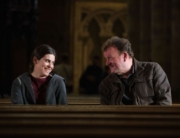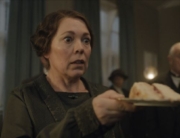Ben Wheatley, the award-winning director of Down Terrace, a domestic gangster movie; the crime/horror hybrid Kill List; and the serial-killer comedy of manners Sightseers, continues his genre experimentation with A Field in England, a psychedelic trip into magic and madness.
In 1648, the English Civil War rages between the royalists forces and the Roundhead army who seek greater democracy. Amid the conflict Commander Trower (Julian Barrett) and alchemist’s assistant Whitehead (Reece Shearsmith) search for the thief of their master’s papers. Fleeing the carnage and pursued by the enraged Trower, cowardly Whitehead escapes the battlefield through a hedgerow and emerges in an overgrown field surrounded by simple-minded Roundhead deserters.
Saved from Trower’s wrath by these Roundheads, who run Trower through with a pike, the God-fearing, subordinate Whitehead joins the seemingly good-natured trio Cutler (Ryan Pope), Jacob (Peter Ferdinando) and Friend (Richard Glover) in search of an alehouse and sustenance. After crossing a vast circle of mushrooms, Cutler concocts a “magic” mushroom stew that quickly creates chaos, before delivering the others to the hands of his master, O’Neill (Michael Smiley), the thief that Whitehead had been sent to apprehend. O’Neill, an armed, bullying necromancer, exerts a sinister control over them all and forces Whitehead to divine for hidden treasure buried in the field.
Field is a difficult film to encapsulate except that it seems distinctly British. Wheatley weaves gothic absurdism through a horror plot. His characters enact a bizarre tug of war reminiscent of Beckett’s Waiting for Godot. When characters sing folksy songs, Denis Potter or Terence Davies comes to mind.
Writer Amy Jump, Ben Wheatley’s on- and off-screen partner, wrote the script for the specific cast members, each distinguished for their careers in British cult comedies. They deliver intense and physical performances with tongue-in-cheek period dialogue that is full of earthy humor. Reece Shearsmith plays sniveling submissive Whitehead brilliantly.
Field was digitally shot beautifully by Laurie Rose in shimmering black and white. The visceral action is intercut with tableaus of the characters frozen, as if posing for an artist to immortalize their suffering, and extreme close-ups of insects crawling through the grass. In one central scene, Whitehead’s mushroom trip is conveyed with strobing and kaleidoscopic visuals, the easy familiarity of which is perhaps the one flaw. James Williams’s eclectic soundtrack combines marching drums with classical strings of the period and builds to thunderous electronica for the raw psychedelic crescendo.
Wheatley drew on diverse references, from UK founding father of docudrama Peter Watkins to Jack Nicholson’s psychedelic 1967 film The Trip and Kineto Shindo’s black-and-white Japanese horror Onibaba, which was entirely shot in a field of elephant grass. In the UK, the film has drawn comparisons to Michael Reeves’s cult civil war-set horror Witchfinder General (1968). A more contemporary American comparison might be Jim Jarmusch’s revisionist black-and-white Western Dead Man, which mixes mysticism and surrealism with dark humor and the brutal realities of the day. While Field doesn’t possess the poetry of Dead Man, Wheatley’s psychedelic, genre-defying take on the English Civil War beautifully creates an original and immersive world with a tiny cast in one eponymous location.
Although liable to perplex and frustrate those looking for easy answers, A Field in England is a visual feast and compelling low-budget filmmaking.

















Leave A Comment